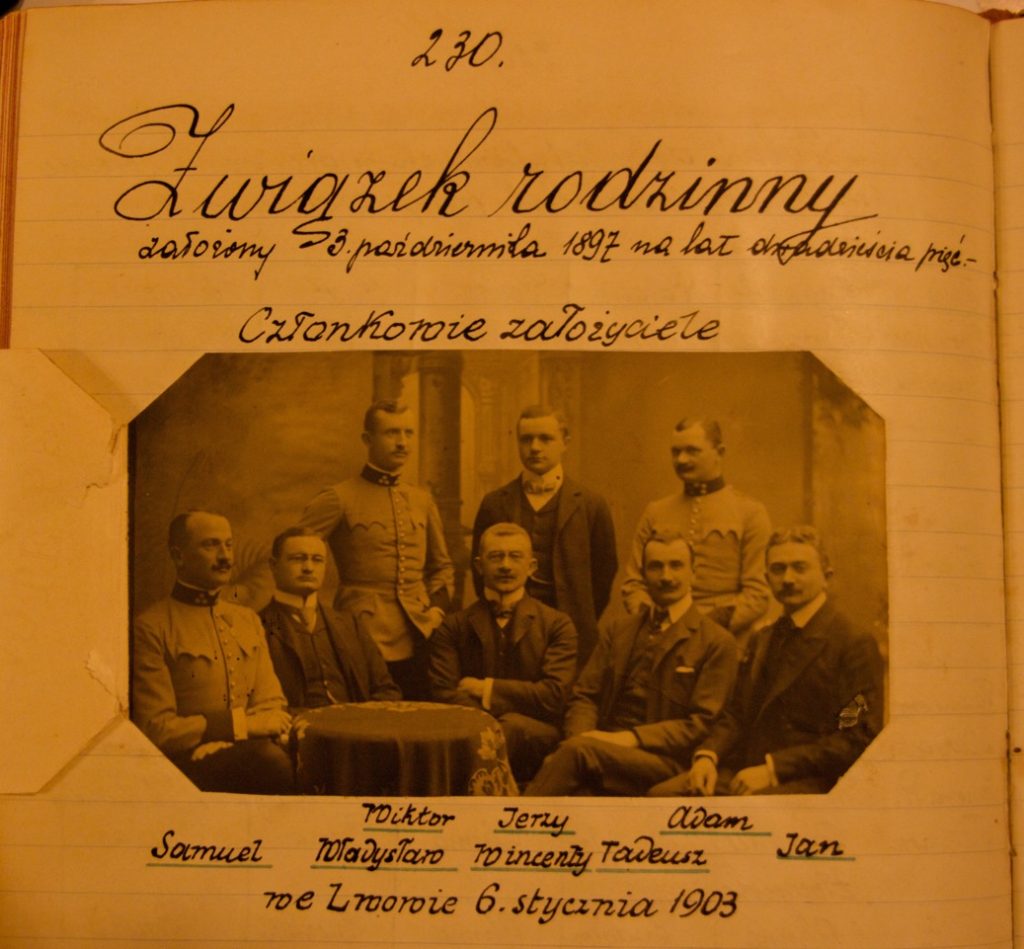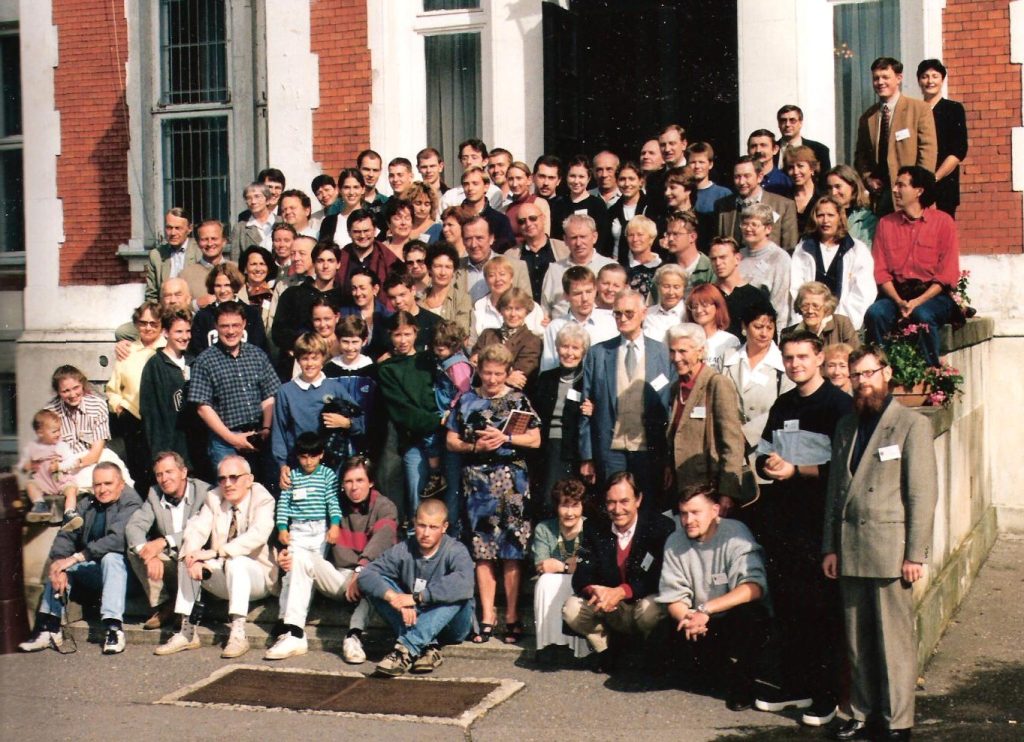The History of the Associations and Societies of the Jordan-Rozwadowski Family
________________________________________________________________________________________________________________
Family associations became a popular form of social life among the Lesser Poland nobility in the 19th century. Such an organization was also formed at the end of that century by the Jordan-Rozwadowski family. It was founded by five Obertyński brothers: Kazimierz, Jan, Zdzisław, Adam, and Emil; three Rozwadowskis: Tomisław, Bartłomiej, and Franciszek; and Aleksander Szymanowski. However, this union dissolved after ten years for unknown reasons.

In 1897, in order to maintain family ties, a new Jordan-Rozwadowski Family Association was established. The main initiator of this venture was Jan Emanuel Rozwadowski, who drafted the statute. The members included:
- From Tomisław’s line: his sons Tadeusz, Samuel, and Wiktor
- From Bartłomiej’s line: his sons Jan Emanuel and Wincenty (1878–1942)
- From Franciszek’s line: his sons Adam (1876–1957) and Jerzy (1881–1966)
- Stefan Rozwadowski
Representatives of related families were also admitted: the Jędrzejowicz brothers (Tomisław’s and Zdzisław’s relatives) and Leon Podleski.
The organization was formed for a 25-year term, after which its future was to be decided. Its guiding principles were “solidarity, discipline, and thrift.”
At the first meeting, monthly contributions were set, along with the requirement to meet every year on January 6. A leadership board was elected, with Tadeusz Rozwadowski as chairman. Two property managers and a secretary were elected annually, and a court of three elder relatives (not members) was appointed — the first being Franciszek Rozwadowski, Aleksander Raciborski, and Jan Obertyński. Jan Rozwadowski acted as inspector overseeing the managers.
Until World War I, the Association thrived, especially with large annual gatherings on the Feast of the Epiphany, usually in Lwów. After the General Assembly meetings, members held banquets at the National Casino, joined by many guests from outside the organization. These feasts, accompanied by fine wines, often ended with bridge games “until late at night or until the last train,” as Adam Rozwadowski noted (1).
During the war, the Association’s activities were suspended, as members were scattered across various fronts or in exile. The pre-war capital (about 25,000 crowns) suffered losses due to war, inflation, and currency changes. The Association’s archives, stored at Jerzy Rozwadowski’s house, were also destroyed (2).
Before the end of the Polish–Soviet War, the Rozwadowskis decided to revive the Association, drafting a new statute (3) and contributing 50,000 Polish marks each (1 dollar = 150 marks). On General Rozwadowski’s advice, the funds were invested in shares of the “Merkury” syndicate and the “Albertyn” company. The general also donated 100 shares of the Potassium Salt Mining Company to the Association (4).
The annual January 6 gatherings resumed, with General Rozwadowski as the central figure, admired for his gentle nature and humor (5). Jan Emanuel Rozwadowski also played a key role, earning the nickname “high priest” from his cousins. However, the 1923 inflation devalued the Association’s shares, and its final financial collapse came after the May Coup. While the general was imprisoned in Vilnius, the authorities confiscated securities from his safe in Kraków’s Industrial Bank, seizing both his and the Association’s assets.

The last known meeting took place on January 6, 1929, in Babin at Wincenty Rozwadowski’s estate. Present from the older generation were Jan, Adam, Wincenty, Władysław, and Jerzy Rozwadowski; from the younger, Edward, Bartłomiej, Tadeusz, Jan Duklan, Franciszek, and Wiktor Jr. At Colonel Adam Rozwadowski’s initiative, they discussed renewing and formally registering the Association, but the proposal lacked support. Colonel Adam later wrote with bitterness that the meeting “ended with a photograph (…) let us hope that the young, once conditions settle, will establish a Rozwadowski family association again, without any additions, not for a limited time but forever, avoiding the mistakes my generation made. Association is strength” (6). He could not have expected that decades would pass before his descendants, in free Poland, would create a family association to cultivate shared history and care for their ancestors’ graves.
This happened only in 1996, with the creation of the Jordan-Rozwadowski Family Association. The founding members were Jacek Rozwadowski (son of Tadeusz), Stanisław Rozwadowski (son of Jerzy), Piotr Rozwadowski (son of Stanisław), and Andrzej Rozwadowski (son of Wiktor). The first board consisted of Erazm Rozwadowski – president, Andrzej Rozwadowski – vice president, Jacek Rozwadowski – administrator, Maria Wala, and Piotr Rozwadowski. The audit committee included Stanisław Rozwadowski, Jadwiga Dembińska, and Zofia Pieczkowska.

Today, the Association maintains contact between family members, many of whom were expelled from their noble estates during World War II and scattered worldwide. Its main activity, as in the past, is organizing family reunions every 2–3 years, now even more important for integration. It also preserves the memory of ancestors and cares for their graves, especially those left in the former eastern territories of the Second Polish Republic (7), and honors the family’s distinguished figures. In exceptional cases, it provides assistance to members in severe hardship.
Based on: Dr. Mariusz Patelski (University of Opole) – Family and Social Life in the Mansions of the Jordan-Rozwadowski Family and Related Families at the Turn of the 19th and 20th Centuries, and other archival sources.
- A. Rozwadowski, Memoirs. “A Heap of Years”, p. 153.
- W. Rozwadowski, Notes Concerning the Family…, p. 46.
- BZNO, Association, ref. no. 7987/II, Draft Statute of the Jordan-Rozwadowski Family Association, Coat of Arms Trąby, pp. 1–45; ibid., 31 October 1920, Minutes of the Commission on the Establishment of the Rozwadowski Family Association, Present: Jan, Wiktor, and Jerzy Rozwadowski, p. 705.
- BZNO, Association, ref. no. 7987/II, Letter from Gen. T. Rozwadowski to Jan Emanuel Rozwadowski, Warsaw, 14 February 1921, p. 138.
- Recording of a conversation with Eng. Stanisław Rozwadowski, Katowice, 18 December 1998 (in the author’s collection).
- A. Rozwadowski, Memoirs. “A Heap of Years”, p. 158.
- For example: buried in Lwów are Gen. Tadeusz Rozwadowski, Maria Tadeuszowa Rozwadowska, Jan Emanuel Rozwadowski, and other members of the Rozwadowski family. Family Chronicle…, pp. 138, 230; St. S. Nicieja, The Łyczaków Cemetery in Lwów in the Years 1786–1986, Wrocław–Warsaw–Kraków–Gdańsk–Łódź 1989, p. 364; idem, The Cemetery of the Defenders of Lwów, Wrocław–Warsaw–Kraków 1990, pp. 273–274.
